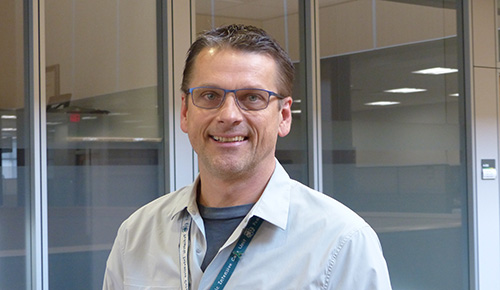
Daniel Garros, a clinical professor in the Division of Pediatric Critical Care, was recognized for his Pediatric Grand Rounds presentation that had a very personal element to it.
When Daniel Garros was fighting sepsis in the General Systems Intensive Care Unit (ICU) at the University of Alberta Hospital, little did he know that his experience would become a way to teach his colleagues and learners how to improve care for patients.
Garros, a clinical professor in the Division of Pediatric Critical Care, developed a Pediatric Grand Rounds presentation that resulted in him receiving the Pediatric Grand Rounds Award at the June 6, 2018 Department of Pediatrics Faculty Appreciation & Recognition Dinner.
"Using my own experience, I made certain stops in my story during grand rounds and emphasized points about sepsis and septic shock. What I think people liked was that it was very real. It's just not teaching out of books or the guidelines. It's teaching with a real life experience behind it," says Garros.
He was taken by EMS to the emergency department in June 2017 and ended up being admitted to the ICU for four days. During his stay, he made observations that he believes can make an impact on the quality of care.
For example, having a warm blanket made a huge difference for Garros, as it provided him with comfort and helped him to sleep. "Many times we leave our patients exposed without any blanket because they have a fever. It doesn't make any difference in the outcome if you put a blanket there or not. But for the patient, it makes a huge difference," he says. He found that the bedside alarms were turned on for too many notifications, especially when a patient's condition has improved. The alarms - many times false - can be very disruptive for a patient's sleep.
Another important difference in his care was his family having open access to see him. "There were many people trying to visit me to the point where the nurses in charge of the ICU came to me and said, 'I think you need some rest.' I said, Sorry, but I don't mind; I want them to visit. Obviously, she did her job and had to control the traffic. I think it's very important to receive the support when you need it the most," says Garros.
Besides sharing his experience through Pediatric Grand Rounds, he has presented on this topic to the adult critical care program joint rounds and at two conferences.
"I'm a strong believer in the power of narratives. I think it resonates with people if you base your teaching or your evidence with stories," says Garros.